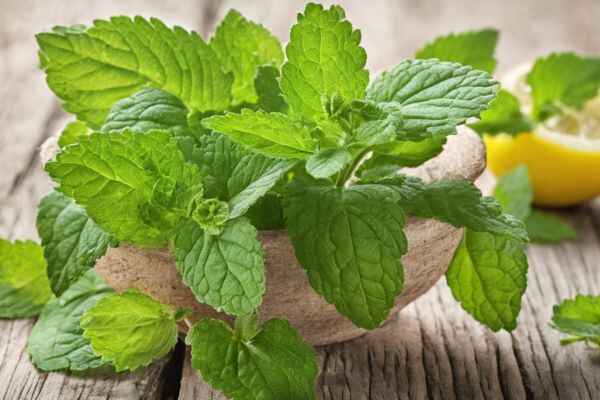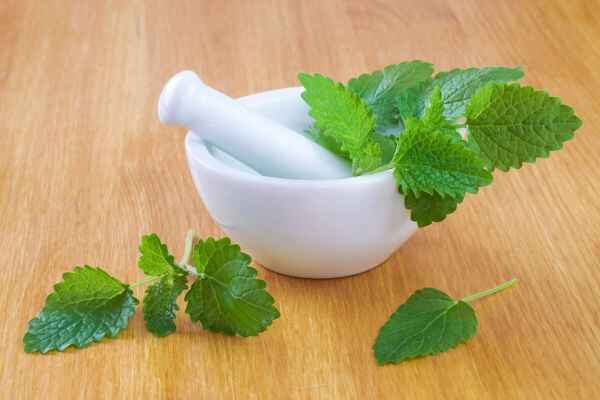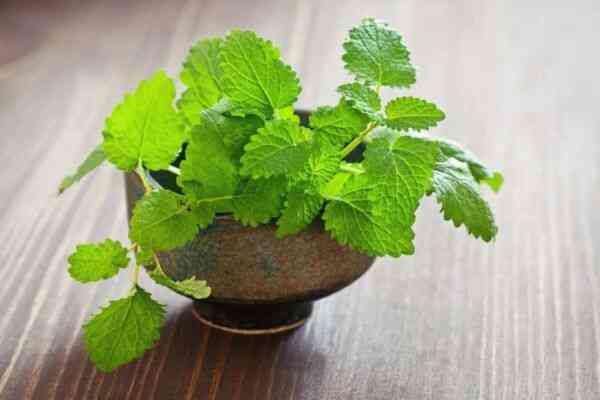10 Amazing Lemon Balm Benefits, Uses, and Medicinal Value

Lemon balm, a fragrant herb with a history dating back centuries, offers a surprising range of benefits for your mental and physical health. This post delves into the science-backed advantages of lemon balm benefits, exploring its effectiveness in combating anxiety, promoting restful sleep, and enhancing cognitive function. Additionally, we’ll uncover its antiviral and antimicrobial properties, making it a valuable ally for skin health. Whether you’re seeking natural solutions for stress management or digestive discomfort, lemon balm presents a versatile and powerful option. Dive deeper and discover how this wonder herb can elevate your overall well-being!
Lemon Balm Benefits – A Natural Approach to Wellness
1. Mental Health Benefits

1) Anxiety and Stress Relief
Lemon balm is highly regarded for its calming effects, which can significantly alleviate symptoms of anxiety and stress.
By enhancing GABA (gamma-aminobutyric acid) levels in the brain, lemon balm helps to promote a sense of relaxation and mental calmness. This makes it a valuable herbal remedy for those looking to manage daily stressors and reduce anxiety levels effectively. Indeed, lemon balm for anxiety is a natural and effective solution.[1].
2) Mood Enhancement
In addition to its stress-relieving properties, lemon balm can also uplift your mood.
Studies have shown that regular consumption of lemon balm can lead to improved mood and better emotional well-being. Its mild sedative effects not only soothe the mind but also help enhance overall mood by reducing mood swings and emotional irregularities.[2].
Read also: 10 Foods That May Cause Depression
3) Cognitive Function Improvement
Lemon balm isn’t just good for your emotional health; it also supports cognitive functions.
Research indicates that lemon balm can improve memory and brain function, particularly in individuals experiencing cognitive decline. This is attributed to its antioxidant properties, which protect brain cells from oxidative stress and improve neural functions, thus boosting cognitive performance.
Its antioxidant activity is one of the key factors in enhancing brain health.[3].
2. Skin Care and Antiviral Properties
Lemon balm, scientifically known as Melissa officinalis, offers many benefits for skin care, thanks to its antiviral activity, antibacterial, and anti-inflammatory properties. Here’s how you can harness these benefits:
1) Antioxidant and Anti-inflammatory Benefits
The antioxidant properties of lemon balm play a crucial role in its skincare benefits and boost immunity.
Compounds like rosmarinic acid and caffeic acid help protect the skin from oxidative stress and UV damage, which are common causes of premature aging.[22][24]These antioxidants also aid in reducing inflammation associated with various skin conditions such as eczema, psoriasis, and acne.[19][23]
Additionally, the anti-inflammatory effects of lemon balm are supported by studies showing significant reduction in inflammation markers, such as TNF-α, in treated subjects.[19].
By incorporating lemon balm into your skincare routine through creams, ointments, or essential oils, you can take advantage of its soothing, healing, and protective properties.
Whether dealing with viral skin infections like cold sores or seeking a natural solution for maintaining healthy, youthful skin, lemon balm offers a versatile and effective option.
1) Cold Sore Treatment
Lemon balm is highly effective against the herpes simplex virus, which causes cold sores.
Studies have shown that topical applications of lemon balm not only reduce the frequency and severity of outbreaks but also accelerate healing due to its antiviral activity.[16][17]For instance, creams containing lemon balm applied to cold sores have been found to significantly improve symptoms like redness and swelling in just a few days.[16]
Furthermore, lemon balm’s antiviral activity extends to other viruses, including influenza and myxoviruses, showcasing its broad antiviral capabilities.[20].
Read also: 14 Bad Habits That Harm Your Pores and Skin
3. Sleep and Relaxation Support

1) Insomnia Management
Lemon balm, often used in combination with other calming herbs like valerian and hops, has shown promise in managing insomnia. For instance, a study involving an herbal blend including lemon balm reported that 81% of participants experienced improved sleep, compared to those taking a placebo.[25].
Additionally, findings suggest that 600 mg of Melissa officinalisL. leaf extract daily can significantly enhance sleep quality, aligning with recommendations from the German Commission E for treating nervous insomnia.[26].
2) Relaxation and Stress Reduction
The calming properties of lemon balm are well-documented, particularly its ability to increase calmness and alertness. Research highlights that a 600 mg dose of lemon balm can significantly uplift mood and enhance relaxation.[32]
Furthermore, lemon balm supports the production of GABA, a neurotransmitter that helps control stress responses, thereby aiding in relaxation and potentially alleviating symptoms of nervousness and anxiety.[32].
3) Herbal Combinations for Improved Sleep Quality
Combining lemon balm with other herbs like valerian, hops, and chamomile has been effective in reducing anxiety and promoting sleep. This synergy not only helps in soothing the mind but also in achieving a more restful sleep state.
Notably, a combination of these herbs has shown positive results.Melissa officinalis L. and Nepeta menthoidesBoiss. & Buhse has been shown to improve insomnia severity and associated depression and anxiety in insomniacs, offering a holistic approach to sleep management.[33].
4. Digestive Health Advantages

1) Alleviating Digestive Symptoms
Lemon balm, known scientifically as Melissa officinalisLemon balm has been recognized for its beneficial effects on functional gastrointestinal disorders.
Compounds within lemon balm can significantly ease discomfort associated with digestive problems such as bloating and indigestion.[34][42]
The European Medicines Agency has approved lemon balm leaf as a traditional herbal medicinal product specifically for the symptomatic treatment of mild gastrointestinal complaints, including bloating and flatulence.[35][40]. This acknowledgment underscores the herb’s effectiveness in providing relief from common digestive disturbances.
Read also: The 9 Worst Foods for Digestion
2) Use for Colic in Infants
Lemon balm has also been traditionally used in treating colicky infants. A combination of herbs including lemon balm has shown promising results. Melissa officinalisThis combination has shown promising results in reducing symptoms of colic, characterized by prolonged periods of inconsolable crying and apparent abdominal pain in infants.[38]
Studies suggest that formulations containing lemon balm, alongside other botanicals like chamomile and fennel, can significantly decrease the duration and frequency of crying episodes in colicky babies.[38][39]
These findings highlight the potential of lemon balm as part of a natural treatment strategy for infantile colic, offering a gentle yet effective option for distressed parents and their babies.
3) Impact on Indigestion and Bloating
The effectiveness of lemon balm in managing indigestion and bloating extends beyond general gastrointestinal relief. It has been used in combination with other calming herbs such as chamomile and mint to enhance digestive health.[36][41]
Research indicates that lemon balm can help treat symptoms of indigestion, and its antibacterial properties contribute to its ability to combat digestive tract infections, which can often exacerbate gastrointestinal symptoms.[36]
By integrating lemon balm into your diet, either through teas or supplements, you can harness its digestive health benefits, promoting a more comfortable and efficient digestive process.
Safety, Dosage, and Side Effects

1) General Safety
Lemon balm is generally considered safe when consumed in amounts typically found in foods.
However, pregnant and breastfeeding women must avoid using lemon balm due to insufficient information on its safety during these sensitive periods.[49][44][52]
Additionally, if you have thyroid disease, you should steer clear of lemon balm as it may alter thyroid function and interfere with thyroid hormone levels and replacement therapy.[50][52]
Always consult with a healthcare provider before starting any new herbal treatment, especially if you have existing health conditions or are taking other medications.[49][44].
2) Dosage Recommendations
For oral use, lemon balm supplements are possibly safe when used at a dose of up to 500 mg daily for up to six months.
When applying lemon balm to the skin, mild side effects like skin irritation may occur, so it’s advisable to test on a small area first.[50][52]
The standard dosages suggested include 1.5-4.5 grams of lemon balm leaf per day for teas, or 2-6 mL of tincture three times daily.[51]
For topical applications, a 1% cream of lemon balm extract can be applied two to four times daily.[51].
3) Potential Drug Interactions
Lemon balm should be used with caution if you are taking sedatives, thyroid medications, or HIV medications, as it may interact with these drugs.
Particularly, lemon balm can increase the sedative effect when taken alongside sedative medications, potentially leading to excessive drowsiness or breathing difficulties.[49][44]
It’s also advised to discontinue using lemon balm at least two weeks before any scheduled surgery to avoid excessive drowsiness from interactions with anesthesia.[50][52].
4) Side Effects
While lemon balm is generally well-tolerated, some individuals may experience side effects such as increased appetite, nausea, dizziness, and wheezing, particularly when taken in doses higher than recommended.[50][52]
Long-term safety beyond six months of use is not well established, and it’s recommended to follow a cycle of three weeks followed by one week off when using lemon balm continuously.[53]
Always start with smaller doses to assess your body’s response and consult with a healthcare provider to minimize risks and ensure safe usage.[53].
Conclusion
Throughout this exploration of lemon balm, we’ve unveiled a treasure trove of natural benefits it offers. From fostering emotional well-being to safeguarding skin health and promoting restful sleep, lemon balm emerges as a holistic approach to wellness.
By incorporating it into your daily routine, you can harness the power of nature to cultivate a healthier, more balanced you. Remember, responsible use is key.
Consulting a healthcare provider before incorporating lemon balm into your regimen ensures a safe and effective experience.
As research continues to explore the depths of this remarkable herb, even more fascinating discoveries await. Let this be the beginning of your journey into the potential of lemon balm and the wonders of herbal medicine!pen_sparktunesharemore_vert
FAQs
1. How should lemon balm be consumed for optimal benefits?
Lemon balm can be taken in various forms depending on your preference:
- Capsules: Consume 300 to 500 mg of dried lemon balm three times daily or as needed.
- Tea: Use 1.5 to 4.5 grams (approximately 1/4 to 1 teaspoon) of dried lemon balm in hot water, steeping it to make tea. You can drink this up to four times a day.
2. What are some creative uses for lemon balm herb?
Lemon balm is versatile in its uses. Here are several ideas:
- Create a herbal syrup for better sleep.
- Prepare a homemade lemon balm bug spray.
- Incorporate chopped fresh leaves into salads or baked goods for added flavor.
- Produce a lip balm to help with cold sores.
- Craft a glycerite with lemon balm.
- Brew a relaxing, stomach-soothing tea.
- Make your own lemon balm soap.
- Prepare simple remedies for bug bites and acne.
3. Is it safe to eat raw lemon balm leaves?
Yes, lemon balm leaves can be eaten raw. Similar to other fresh herbs like mint, lemon balm adds a bright, fragrant flavor to dishes. You can add whole leaves to green salads or use them finely chopped over fruit salads for a zestful taste. So, if you’re wondering, ‘Can you eat lemon balm?’ the answer is a resounding yes.
4. Is it recommended to drink lemon balm tea daily?
Yes, you can drink lemon balm tea daily. Brew 1.5 to 4.5 grams of lemon balm leaves in 150 milliliters of hot water. This tea can be consumed several times throughout the day. Additionally, the leaves themselves can be eaten, up to 10 grams per day. However, it’s advisable to consult with a healthcare provider regarding the appropriate dosage for supplements.




